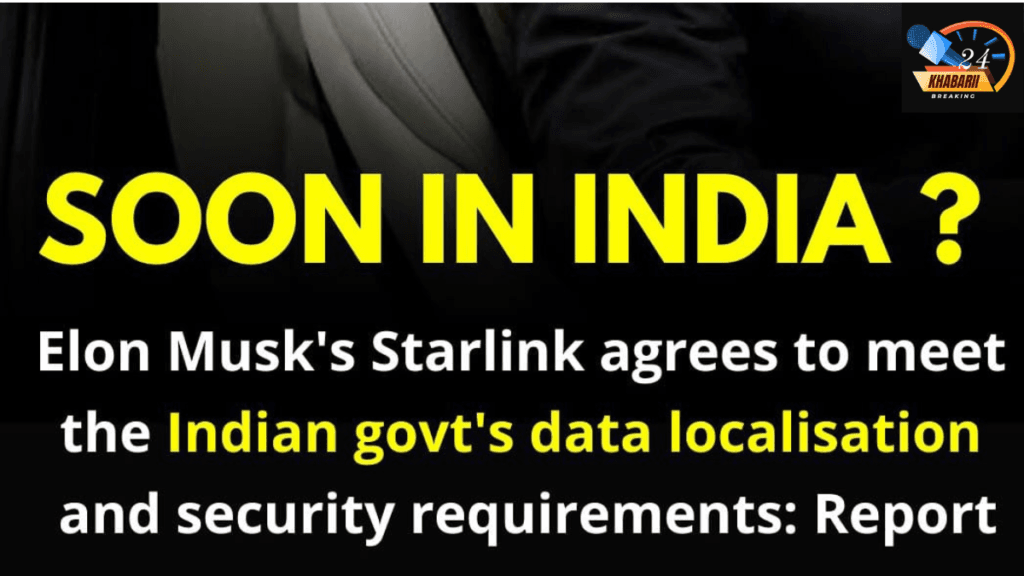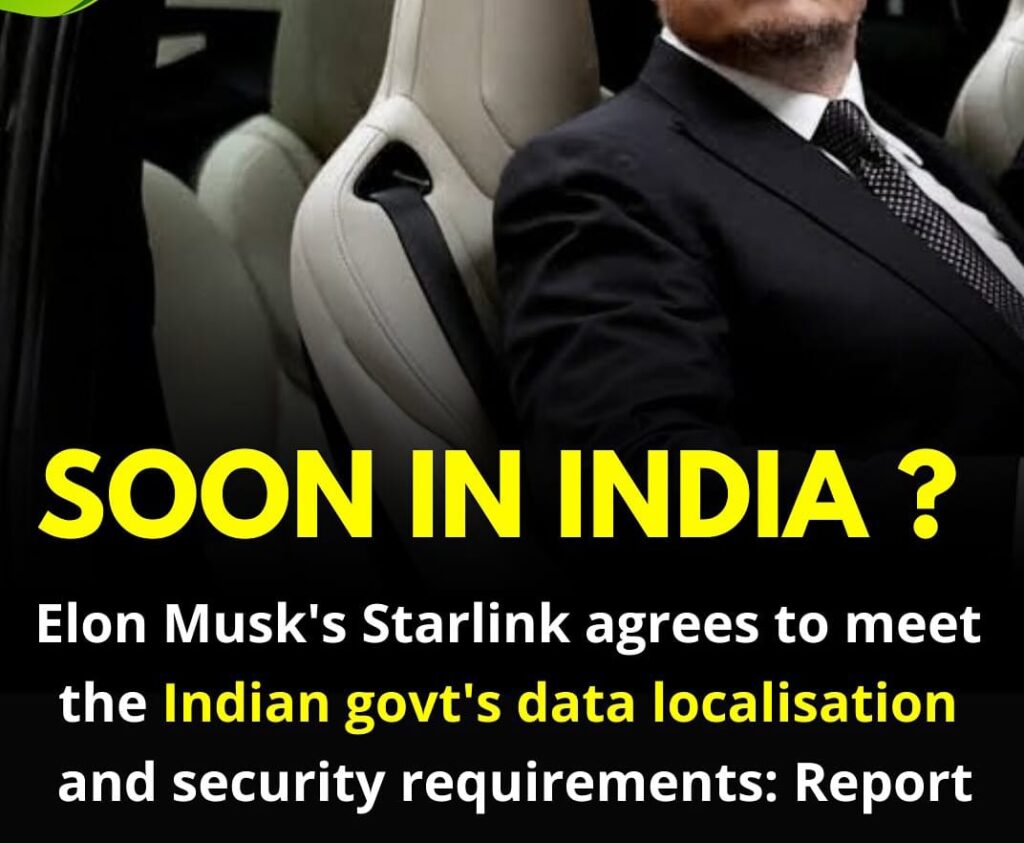
Elon Musk’s Starlink to Soon Enter Indian Market :- Starlink, the satellite internet project of Elon Musk, is ready to enter India after reports claimed it has complied with the requirements on data localization and security imposed by the government. Starlink’s strategy fits within the confines of India’s draconian data laws, which require that all data pertaining to satellite communication be retained on local servers. This compliance was instrumental in Starlink’s application for the Global Mobile Personal Communication by Satellite Services (GMPCS) license which is issued by the Department of Telecommunications (DoT)

Starlink’s Journey Toward Licensing
Starlink was the first to seek GMPCS permission in October 2022. The licensing also requires satellite operators to comply with the country’s regulations which assert that any data generated and used in the country must be kept within the country’s borders. This is intended to enhance internal security as well as limit exposure to threats associated with foreign data systems. Starlink’s latest reconciliation with the authorities ensures that the company can expect to get the last regulatory clearances, therefore, being the third company – after Jio Satellite Communications and OneWeb – to commercially introduce satellite-based internet services in India

The Potential Impact of Starlink in India
Starlink’s foray into the Indian market is filled with optimism especially in the case of remote or underserved regions. Satellite internet technology can close the connectivity gap experienced in areas where there is no viable option of laying down traditional broadband infrastructure as it would be very expensive to do so. When it is finally launched in India, Starlink is expected to be providing fast and stable internet connectivity all over the country, which could change the situation for many sectors in the country such as rural areas, government, health, and education.

The objective of the company is to deploy satellite constellations in low earth orbit which enable lower latencies and quicker transfer speeds as compared to traditional satellite internet services. Such a model has been effectively deployed in some portions of the U.S. that are serviced by Starlink where there is little to no supportable infrastructure present.
Government’s Final Review and Timeline
The conclusion of the regulatory process is anticipated in the near future with an approval most probably forthcoming in a few weeks. As for now, DoT officials are busy with the last checks awaiting clearance from some of the key officials, particularly Telecom Secretary Neeraj Mittal and Minister of Communications Ashwani Vaishnav, who are likely to give green light to Starlink’s begging for licenses. If and when they receive approval, Starlink will commence work likely within the parameters of pilot projects as well as during the setting up of required facilities for service launch.

Nevertheless, its actual rollout will be contingent on the outcome of the forthcoming talks with the Telecom Regulatory Authority of India (TRAI) on matters relating to the pricing and distribution of the spectrum. This last stage will be the determining factor if Starlink is to function in the indeed open yet overtly restrictive nature of India’s telecom sector.
Focus In on the Issue of Digital Connectivity in Non-Urban Areas
Starlink’s introduction to the Indian market has special meaning and importance when it comes to tackling the issue of the information gap in rural and far-flung areas. Starlink uses low-Earth orbit satellites to provide internet services that are high-speed and low-latency even in targeted high-density potential areas that lack fiber optic cables or standard mobile phone coverage.
There are expectations that the satellite internet provision will be helpful not only to individual consumers but also to rural clinics, meeting rooms for educational establishments, and mobilization services where constant internet connection is a must. These positive changes perhaps will be vital to the Digital India campaign launched in India with a purpose to span technology and access to it through the internet as a utility everywhere in the country.
Milestones in Starlink’s Compliance and Licensing Efforts
In 2022, Starlink requested for the GMPCS license due to its multiple satellites and, after that put in place policies to ensure adherence to data localization. Data localization is vital for sensitive data to be shielded from unauthorized access by third parties. This comes a few years after the Indian government raised red flags over issues with Indian data and its management in an advancing digital India. With such compliance in place, Starlink will be the third satellite internet provider to operate in India after Jio Satellite Communications and OneWeb.
Challenges and Next Steps: Spectral Management and Financial Policy
While it can be mused that there is no longer anything important that remains to be sufficient the processes for regulatory approval, it must still be argued that there are some challenging processes that remained. These will include negotiations for spectrum allocation and pricing for Starlink and other satellite providers, both for which will or may have an effect on the pricing for services rendered. The Telecom Regulatory Authority of India (TRAI), is however the organization that will hold these matters with respect to Starlink and its rivals so that there is an equitable access to these essential components without compromising on the cost and distribution of the spectrum against the competition. Elon Musk’s Starlink to Soon Enter Indian Market.

Potential Competition with Local Telecom Giants
Starlink has its own plans of expansion into India and this new venture would pose a challenge for players such as Reliance Jio and Bharti Airtel, who have recently, albeit cautiously, ventured into satellite internet service via their Jio Sat and OneWeb, respectively. Yet, traditional carriers offer fiber and cellular networks, their satellite divisions are also growing, aiming to provide quality communication in the hard-to-reach areas. It is expected that the competition will make services more affordable and induce improvements in the quality of services offered to users of the services irrespective of where they belong in the society.
Economic Impact and Job Creation
When it comes to Starlink, there are expectations that it will also deliver economic impacts. The construction of local facilities such as satellite gateways and operational centers, for instance, will most likely lead to job opportunities. In addition, Starlink’s operations may attract other players in the satellite business to the Indian due to growth in the digital space, therefore advancing the technology economy in the country. As numerous regions become connected to the internet, businesses will be able to cater to audiences in previously inaccessible areas thus fostering local businesses and enhancing online shopping.

Future Perspective of Satellite Internet in India
With the impending launch of Starlink, it is expected that the satellite internet landscape in India will undergo rapid transformation. With the increase in infrastructure, other foreign and local investors may be interested in pouring resources, thus, increasing the prospects of India as a go-to center for satellite services. This surge in satellite providers can assist India’s quest in providing next generation connectivity services, which encourage creativity in areas such as IoT, tele health services, and education at the countryside where strong internet services are a prerequisite
The future relationship between the Indian government and companies like Starlink could be a trend setter for other technology investors in India knowing the countries strict data policies. Its launch will change the narrative on digital access and transformation in the country, as millions of satellite illiterate citizens are expected to benefit from this technology and its associated resources.
The Future of Satellite Internet in IndiaThe Future of Satellite Internet in India
As Starlink is about to make a foray into the Indian market, satellite internet services are poised to revolutionize the digital fabric of the country. Besides improving internet penetration, this trend also makes India a nascent market for satellite communication and therefore a target for investment by other technology companies around the globe.
Elon Musk’s Starlink to Soon Enter Indian Market Elon Musk’s Starlink to Soon Enter Indian Market Elon Musk’s Starlink to Soon Enter Indian Market
🚨 Elon Musk's Starlink has agreed to meet India's data localisation and security requirements. (@DanishKh4n)
— Indian Tech & Infra (@IndianTechGuide) November 11, 2024
Starlink broadband into India soon. 📡🇮🇳 pic.twitter.com/eYQEqmYSOt



